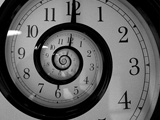Today.Az » Weird / Interesting » Quantum time machine 'allows paradox-free time travel'
24 July 2010 [12:45] - Today.Az
Quantum physicists at the Massachusetts Institute of Technology believe it is possible to create a time machine which could affect the past without creating a "grandfather paradox".
 Scientists have for some years been able to 'teleport' quantum states from one place to another. Now Seth Lloyd and his MIT team say that, using the same principles and a further strange quantum effect known as 'postselection', it should be possible to do the same backwards in time. Lloyd told the Technology Review: "It is possible for particles (and, in principle, people) to tunnel from the future to the past."
Scientists have for some years been able to 'teleport' quantum states from one place to another. Now Seth Lloyd and his MIT team say that, using the same principles and a further strange quantum effect known as 'postselection', it should be possible to do the same backwards in time. Lloyd told the Technology Review: "It is possible for particles (and, in principle, people) to tunnel from the future to the past."
Postselection is a vital part of the nascent science of quantum computing. In traditional computing, if a user needs to determine which set of variables in an equation leads to the answer being true, the computer must try every combination until it hits upon one that works. In quantum computing, due to the weird parallel behaviour of subatomic particles, it seems to be possible to simplify the procedure by running all possible variations simultaneously, and selecting only the combinations that make the answer true.
Professor Lloyd and his team say that, by combining teleportation and postselection, it would be possible to carry out the quantum teleportation effect in reverse; that is, to decide after the teleportation what the quantum state must have been before it. This works as postselection allows you to dictate which quantum states can be teleported, limiting what state it can have been in before the teleportation. The state of the particle post-teleportation has therefore, in effect, travelled back in time.
Dr Richard Low, a quantum computing scientist from the University of Bristol, says: "You could think of it as postselection affecting the history of the particle, sending the state back in time."
Unlike previous theories of teleportation, this apparently avoids the "grandfather paradox" - or, to Back to the Future fans, the Marty McFly problem. If you go back and change time, and accidentally end up killing your own grandparent, you create a paradox - you will not be born, so you cannot go back and affect time. Even with subatomic particles, this is still a problem: upon travelling back in time, the particle could somehow destroy its earlier self or move it, thus preventing it from travelling.
However, because of the probabilistic nature of quantum mechanics, Prof Lloyd's method seems to avoid this. Anything caused by the time travel must have had a finite probability of happening anyway, so paradoxical impossibilities are out.
Further, this time travel method does not involve bending spacetime, unlike other proposed systems. At the moment, the only conditions known that would bend spacetime sufficiently exist in black holes, which would be impractical at best.
It is a controversial theory, to say the least. Some physicists claim that the apparently impossible things implied by postselection prove that it cannot work, which would destroy Prof Lloyd's theory before it got off the ground.
The theory is unlikely to lead to DeLorean time machines or anything remotely similar. Instead, Prof Lloyd and his team hope that it can advance our understanding of physics: "Our hope is that this theory may prove useful in formulating a quantum theory of gravity," he says.
/Telegraph.co.uk/
|
|